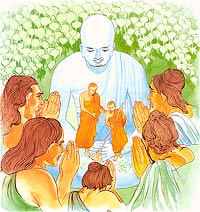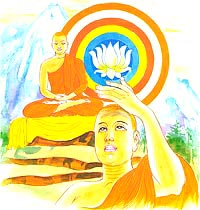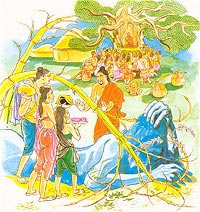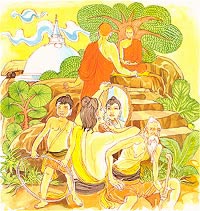Free Online FOOD for MIND & HUNGER - DO GOOD 😊 PURIFY MIND.To live like free birds 🐦 🦢 🦅 grow fruits 🍍 🍊 🥑 🥭 🍇 🍌 🍎 🍉 🍒 🍑 🥝 vegetables 🥦 🥕 🥗 🥬 🥔 🍆 🥜 🎃 🫑 🍅🍜 🧅 🍄 🍝 🥗 🥒 🌽 🍏 🫑 🌳 🍓 🍊 🥥 🌵 🍈 🌰 🇧🇧 🫐 🍅 🍐 🫒Plants 🌱in pots 🪴 along with Meditative Mindful Swimming 🏊♂️ to Attain NIBBĀNA the Eternal Bliss.
Kushinara NIBBĀNA Bhumi Pagoda White Home, Puniya Bhumi Bengaluru, Prabuddha Bharat International.
11/21/21
Filed under: General, Theravada Tipitaka , Plant raw Vegan Broccoli, peppers, cucumbers, carrots
Posted by: site admin @ 4:55 pm
Posted by: site admin @ 4:55 pm
𝓛𝓔𝓢𝓢𝓞𝓝 4159 Mon 22 Nov 2021
Do Good Purify Mind - Path to Eternal Bliss
SN 45.159 (S v 51)
Āgantuka Sutta
— Visitors —
[āgantuka]
How the Noble Path works with the abhiññā pertaining to various dhammas as a guest-house welcoming various kinds of visitors.
Seyyathāpi,
bhikkhave, āgantukāgāraṃ. Tattha puratthimāyapi disāya āgantvā vāsaṃ
kappenti, pacchimāyapi disāya āgantvā vāsaṃ kappenti, uttarāyapi disāya
āgantvā vāsaṃ kappenti, dakkhiṇāyapi disāya āgantvā vāsaṃ kappenti;
khattiyāpi āgantvā vāsaṃ kappenti, brāhmaṇāpi āgantvā vāsaṃ kappenti,
vessāpi āgantvā vāsaṃ kappenti, suddāpi āgantvā vāsaṃ kappenti.
bhikkhave, āgantukāgāraṃ. Tattha puratthimāyapi disāya āgantvā vāsaṃ
kappenti, pacchimāyapi disāya āgantvā vāsaṃ kappenti, uttarāyapi disāya
āgantvā vāsaṃ kappenti, dakkhiṇāyapi disāya āgantvā vāsaṃ kappenti;
khattiyāpi āgantvā vāsaṃ kappenti, brāhmaṇāpi āgantvā vāsaṃ kappenti,
vessāpi āgantvā vāsaṃ kappenti, suddāpi āgantvā vāsaṃ kappenti.
Evameva
kho, bhikkhave, bhikkhu ariyaṃ aṭṭhaṅgikaṃ maggaṃ bhāvento ariyaṃ
aṭṭhaṅgikaṃ maggaṃ bahulīkaronto ye dhammā abhiññā pariññeyyā, te dhamme
abhiññā parijānāti, ye dhammā abhiññā pahātabbā, te dhamme abhiññā
pajahati, ye dhammā abhiññā sacchikātabbā, te dhamme abhiññā
sacchikaroti, ye dhammā abhiññā bhāvetabbā, te dhamme abhiññā bhāveti.
kho, bhikkhave, bhikkhu ariyaṃ aṭṭhaṅgikaṃ maggaṃ bhāvento ariyaṃ
aṭṭhaṅgikaṃ maggaṃ bahulīkaronto ye dhammā abhiññā pariññeyyā, te dhamme
abhiññā parijānāti, ye dhammā abhiññā pahātabbā, te dhamme abhiññā
pajahati, ye dhammā abhiññā sacchikātabbā, te dhamme abhiññā
sacchikaroti, ye dhammā abhiññā bhāvetabbā, te dhamme abhiññā bhāveti.
Katame
ca, bhikkhave, dhammā abhiññā pariññeyyā? Pañcupādānakkhandhātissa
vacanīyaṃ. Katame pañca? Seyyathidaṃ rūp·upādāna-k·khandho
vedan·ūpādāna-k·khandho saññ·ūpādāna-k·khandho saṅkhār·ūpādāna-k·khandho
viññāṇ·upādāna-k·khandho. Ime, bhikkhave, dhammā abhiññā pariññeyyā.
ca, bhikkhave, dhammā abhiññā pariññeyyā? Pañcupādānakkhandhātissa
vacanīyaṃ. Katame pañca? Seyyathidaṃ rūp·upādāna-k·khandho
vedan·ūpādāna-k·khandho saññ·ūpādāna-k·khandho saṅkhār·ūpādāna-k·khandho
viññāṇ·upādāna-k·khandho. Ime, bhikkhave, dhammā abhiññā pariññeyyā.
Katame ca, bhikkhave, dhammā abhiññā pahātabbā? Avijjā ca bhavataṇhā ca. Ime, bhikkhave, dhammā abhiññā pahātabbā.
Katame ca, bhikkhave, dhammā abhiññā sacchikātabbā? Vijjā ca vimutti ca. Ime, bhikkhave, dhammā abhiññā sacchikātabbā.
Katame ca, bhikkhave, dhammā abhiññā bhāvetabbā? Samatho ca vipassanā ca. Ime, bhikkhave, dhammā abhiññā bhāvetabbā.
Kathañca,
bhikkhave, bhikkhu ariyaṃ aṭṭhaṅgikaṃ maggaṃ bhāvento ariyaṃ
aṭṭhaṅgikaṃ maggaṃ bahulīkaronto, ye dhammā abhiññā pariññeyyā te dhamme
abhiññā parijānāti, ye dhammā abhiññā pariññeyyā te dhamme abhiññā
parijānāti, ye dhammā abhiññā pariññeyyā te dhamme abhiññā parijānāti,
ye dhammā abhiññā bhāvetabbā, te dhamme abhiññā bhāveti?
bhikkhave, bhikkhu ariyaṃ aṭṭhaṅgikaṃ maggaṃ bhāvento ariyaṃ
aṭṭhaṅgikaṃ maggaṃ bahulīkaronto, ye dhammā abhiññā pariññeyyā te dhamme
abhiññā parijānāti, ye dhammā abhiññā pariññeyyā te dhamme abhiññā
parijānāti, ye dhammā abhiññā pariññeyyā te dhamme abhiññā parijānāti,
ye dhammā abhiññā bhāvetabbā, te dhamme abhiññā bhāveti?
Evaṃ
kho, bhikkhave, bhikkhu ariyaṃ aṭṭhaṅgikaṃ maggaṃ bhāvento ariyaṃ
aṭṭhaṅgikaṃ maggaṃ bahulīkaronto ye dhammā abhiññā pariññeyyā, te dhamme
abhiññā parijānāti, ye dhammā abhiññā pahātabbā, te dhamme abhiññā
pajahati, ye dhammā abhiññā sacchikātabbā, te dhamme abhiññā
sacchikaroti, ye dhammā abhiññā bhāvetabbā, te dhamme abhiññā bhāvetī
ti.
kho, bhikkhave, bhikkhu ariyaṃ aṭṭhaṅgikaṃ maggaṃ bhāvento ariyaṃ
aṭṭhaṅgikaṃ maggaṃ bahulīkaronto ye dhammā abhiññā pariññeyyā, te dhamme
abhiññā parijānāti, ye dhammā abhiññā pahātabbā, te dhamme abhiññā
pajahati, ye dhammā abhiññā sacchikātabbā, te dhamme abhiññā
sacchikaroti, ye dhammā abhiññā bhāvetabbā, te dhamme abhiññā bhāvetī
ti.
30) Classical English,Roman,
Suppose,
monks, there is a guest-house. Travelers come from the east to lodge
here, come from the west to lodge here, come from the north to lodge
here, come from the south to lodge here; nobles come to lodge here,
Brahmans come to lodge here, merchants come to lodge here, and serfs
come to lodge here.
monks, there is a guest-house. Travelers come from the east to lodge
here, come from the west to lodge here, come from the north to lodge
here, come from the south to lodge here; nobles come to lodge here,
Brahmans come to lodge here, merchants come to lodge here, and serfs
come to lodge here.
In
the same way, monks, a monk who cultivates the Noble Eightfold Path,
who practices assiduously the Noble Eightfold Path, comprehends with
higher knowledge those states that are to be comprehended with higher
knowledge, abandons with higher knowledge those states that are to be
abandoned with higher knowledge, comes to experience with higher
knowledge those states that are to be experienced with higher knowledge,
and cultivates with higher knowledge those states that are to be
cultivated with higher knowledge.
the same way, monks, a monk who cultivates the Noble Eightfold Path,
who practices assiduously the Noble Eightfold Path, comprehends with
higher knowledge those states that are to be comprehended with higher
knowledge, abandons with higher knowledge those states that are to be
abandoned with higher knowledge, comes to experience with higher
knowledge those states that are to be experienced with higher knowledge,
and cultivates with higher knowledge those states that are to be
cultivated with higher knowledge.
What,
monks, are the states to be comprehended with higher knowledge? They
are the five groups of clinging.{1} Which five? The body-group, the
feeling-group, the perception-group, the mental-formation group, the
consciousness-group. These, monks, are the states to be comprehended
with higher knowledge.
monks, are the states to be comprehended with higher knowledge? They
are the five groups of clinging.{1} Which five? The body-group, the
feeling-group, the perception-group, the mental-formation group, the
consciousness-group. These, monks, are the states to be comprehended
with higher knowledge.
What,
monks, are the states to be abandoned with higher knowledge? They are
ignorance and the desire for [further] becoming. These, monks, are the
states to be abandoned with higher knowledge.
monks, are the states to be abandoned with higher knowledge? They are
ignorance and the desire for [further] becoming. These, monks, are the
states to be abandoned with higher knowledge.
And
what, monks, are the states to be experienced with higher knowledge?
They are knowledge and liberation. These, monks, are the states to be
experienced with higher knowledge.
what, monks, are the states to be experienced with higher knowledge?
They are knowledge and liberation. These, monks, are the states to be
experienced with higher knowledge.
And
what, monk, are the states to be cultivated with higher knowledge? They
are calm and insight. These, monks, are the states to be cultivated
with higher knowledge.
what, monk, are the states to be cultivated with higher knowledge? They
are calm and insight. These, monks, are the states to be cultivated
with higher knowledge.
who
practices assiduously the Noble Eightfold Path, comprehends with higher
knowledge those states that are to be comprehended with higher
knowledge, abandons with higher knowledge those states that are to be
abandoned with higher knowledge, comes to experience with higher
knowledge those states that are to be experienced with higher knowledge,
and cultivates with higher knowledge those states that are to be
cultivated with higher knowledge?
practices assiduously the Noble Eightfold Path, comprehends with higher
knowledge those states that are to be comprehended with higher
knowledge, abandons with higher knowledge those states that are to be
abandoned with higher knowledge, comes to experience with higher
knowledge those states that are to be experienced with higher knowledge,
and cultivates with higher knowledge those states that are to be
cultivated with higher knowledge?
And how does a monk who cultivates the Noble Eightfold Path,
In
this, monks, a monk cultivates Right View that is based on detachment,
dispassion, cessation, leading to maturity of surrender,{2} Right
Intention that is based on detachment, dispassion, cessation, leading to
maturity of surrender, Right Speech that is based on detachment,
dispassion, cessation, leading to maturity of surrender, Right Action
that is based on detachment, dispassion, cessation, leading to maturity
of surrender, Right Livelihood that is based on detachment, dispassion,
cessation, leading to maturity of surrender, Right Effort that is based
on detachment, dispassion, cessation, leading to maturity of surrender,
Right Mindfulness that is based on detachment, dispassion, cessation,
leading to maturity of surrender, Right Concentration that is based on
detachment, dispassion, cessation, leading to maturity of surrender.
this, monks, a monk cultivates Right View that is based on detachment,
dispassion, cessation, leading to maturity of surrender,{2} Right
Intention that is based on detachment, dispassion, cessation, leading to
maturity of surrender, Right Speech that is based on detachment,
dispassion, cessation, leading to maturity of surrender, Right Action
that is based on detachment, dispassion, cessation, leading to maturity
of surrender, Right Livelihood that is based on detachment, dispassion,
cessation, leading to maturity of surrender, Right Effort that is based
on detachment, dispassion, cessation, leading to maturity of surrender,
Right Mindfulness that is based on detachment, dispassion, cessation,
leading to maturity of surrender, Right Concentration that is based on
detachment, dispassion, cessation, leading to maturity of surrender.
In
this way he comprehends with higher knowledge those states that are to
be comprehended with higher knowledge, abandons with higher knowledge
those states that are to be abandoned with higher knowledge, comes to
experience with higher knowledge those states that are to be experienced
with higher knowledge, and cultivates with higher knowledge those
states that are to be cultivated with higher knowledge.
this way he comprehends with higher knowledge those states that are to
be comprehended with higher knowledge, abandons with higher knowledge
those states that are to be abandoned with higher knowledge, comes to
experience with higher knowledge those states that are to be experienced
with higher knowledge, and cultivates with higher knowledge those
states that are to be cultivated with higher knowledge.
buddha-vacana.org
Agantuka Sutta (SN 45.159)
Verse 157. Safeguard Your Own Self
If one holds oneself as dear,
protected, one protects oneself.
One who’s wise should be aware
through all the watches three.
Explanation: If you are aware that you are fond of your own self then protecting it is the best safeguard. You must take measures to protect your self in one of the three stages of life - namely childhood, youth and old age. The best safeguard is the acquisition of virtue.

Verse 158. Giver Advice While Being Virtuous Yourself
One should first establish
oneself in what is proper.
One may then teach others,
and wise, one is not blamed.
Explanation: If you are keen to advise others, in the first instance establish yourself in the proper virtues. It is only then that you become fit to instruct others.

Verse 159. Discipline Yourself Before You Do Others
As one teaches others
so should one do oneself.
Well-tamed, on may tame others,
oneself to tame is hard.
Explanation: If you are keen to discipline others in the same way, you must yourself behave in that manner. It is the best disciplined person, who will disciplined others best. The most difficult to be disciplined is one’s own self indeed.

Verse 160. One Is One’s Best Saviour
Oneself is refuge of oneself,
who else indeed could refuge be?
By good training of oneself
one gains a refuge hard to gain.
Explanation: The saviour of oneself is one’s own self. What other person could be your saviour? This is a difficult kind of help - being your own saviour. It can be achieved only through self discipline.

Verse 161. The Unwise Person Comes To Grief On His Own
By oneself is evil done,
it’s born of self and self-produced.
Evil grinds the unwise one
as diamond does the hardest gem.
Explanation: The diamond is born of, produced and is sprung from stone. But it cut the precious stone. The evil action is born of, produced by, and sprung from the evil doer.

Verse 162. Evil Action Crushes The Doer
He whose conduct’s very bad
like oak-tree choked with ivy,
so he does towards himself
what enemies would wish.
Explanation: The extremely evil action of the person lacking in virtue is similar to that of the parasitic maluva creeper. The creeper grows on the tree and crushes in into destruction. The evil doer’s action too crushes himself in that way.

Verse 163. Doing Good Unto One’s Own Self Is Difficult
Easy is what’s bad to do,
what’s harmful to oneself.
But what is good, of benefit,
is very hard to do.
Explanation: Those actions which are very bad and harmful to one’s own self can be very easily done. But if some action is good for one’s own self; that kind of right action will be found to be difficult to do.

Verse 164. The Wicked Are Self-Destructive
Whatever man unwise relies
on evil views and so condemns
the Teaching of the Arahats,
or Noble Ones who Dhamma live,
he, as a bamboo fruiting,
fruits to self-destruction.
Explanation: There are some ignorant ones who, due to some harmful views, obstruct the teachings of noble saints, who conduct their lives righteously. They, like the bamboo plant that are destroyed when they bear fruit, are self-destructing.

Verse 165. Purity, Impurity Self-Created
By oneself is evil done,
by oneself defiled,
by oneself it’s left undone,
by self alone one purified.
Purity, impurity on oneself depend,
no one can purify another.
Explanation: It is by one’s own self that evil is done. It is one’s own actions that defiles a person. If a person does not commit evil action, one is purified. A person is cleansed entirely by one’s own self. One cannot purify another. Purity and impurity both depend on one’s own self.

Verse 166. Help Others - But Promote One’s Own Good
Let none neglect their good
for others’ good however great.
Know well oneself’s own good
and to that good attend.
Explanation: One should not neglect one’s own spiritual progress in the course of many acts of service to others. Be fully aware of one’s own spiritual interest, and promote one’s own higher goals
0 comments
